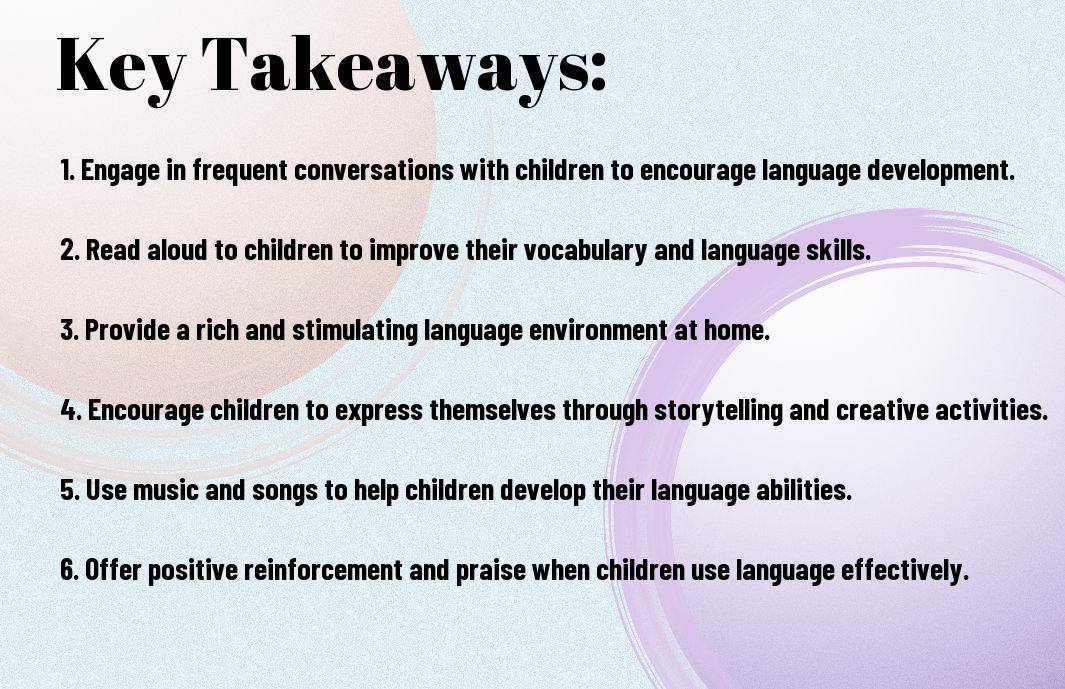Language development is a crucial aspect of a child’s overall growth and it plays a vital role in their cognitive and social development. In this blog post, we will discuss some effective strategies to encourage language development in children, from infancy through early childhood. It is important to acknowledge that a child’s early years are critical for language development, laying the foundation for future learning and communication skills. We will explore the benefits of using interaction, play, and exposure to language-rich environments in nurturing a child’s language abilities, as well as the risks of neglecting language development in the early years. By implementing these strategies, parents and caregivers can actively contribute to their child’s language development, ensuring they are well-equipped for success in school and beyond.
Key Takeaways:
- Consistent Language Exposure: Providing a rich and diverse linguistic environment is crucial for language development in children.
- Responsive Interaction: Engaging in meaningful conversations and responding to a child’s communication cues can significantly support language growth.
- Encouraging Literacy: Reading, storytelling, and exposure to written language are essential for fostering language skills in children.

Establishing a Language-Rich Environment
Creating a language-rich environment is crucial for promoting language development in young children. Helping Toddlers Expand Language Skills is a helpful resource for parents and caregivers to understand the importance of language-rich environments.
Creating Opportunities for Interaction
Engaging in meaningful conversations with young children is an effective way to promote language development. Encouraging children to express themselves and actively listening to their responses helps in building their vocabulary and communication skills. It is important to provide opportunities for interactive communication, such as asking open-ended questions and responding with enthusiasm and encouragement.
Using Books and Storytelling
Reading books and storytelling are powerful tools for stimulating a child’s language development. By exposing children to a variety of books and stories, we can expand their vocabulary, enhance their comprehension skills, and ignite their imagination. Reading aloud to children also helps to strengthen their listening skills and develop a love for literature.
Furthermore, involving children in storytelling by encouraging them to create their own stories can foster creativity and language expression. It is important to provide a range of age-appropriate books and storytelling materials that cater to the interests and abilities of the child.
In addition to reading books and telling stories, incorporating conversations about the characters and plots can deepen the child’s understanding and engagement with the material. Discussing the stories and asking open-ended questions can further promote language development and critical thinking skills.

Parental Engagement and Modeling
Parental engagement and modeling play a crucial role in a child’s language development. As a parent, your active involvement in your child’s language learning journey can significantly impact their language skills. By providing a language-rich environment and modelling effective communication, you can support your child’s language development. To learn more about how you can encourage a child’s language development, visit How can you encourage a child’s language development?
The Role of Parent-Child Conversations
Parent-child conversations play a crucial role in language development. Engaging in back-and-forth interactions with your child helps them learn turn-taking, improves their listening skills, and expands their vocabulary. When parents actively listen and respond to their child’s attempts at communication, it encourages them to continue expressing themselves and contributes to the development of their language skills.
Strategies for Expanding Vocabulary
There are several effective strategies for expanding your child’s vocabulary. Reading aloud to your child, discussing the meaning of unfamiliar words, and introducing new words during daily activities are all effective ways to enhance their vocabulary. Additionally, encouraging your child to ask questions and providing them with opportunities to use new words in context can further support their language development.
One effective strategy for expanding vocabulary is to incorporate activities that encourage word learning, such as playing word games, using flashcards, and engaging in storytelling. These activities not only help children learn new words but also make the process enjoyable and engaging for them, fostering a positive attitude towards language learning.
Incorporating Play and Socialization
Play and socialization are crucial elements in encouraging language development in children. By incorporating play and socialization activities, parents and educators can create a stimulating environment that nurtures language skills in young learners.
Educational Games and Activities
Educational games and activities are an effective way to enhance language development in children. Board games, puzzles, and interactive storytelling are great tools to introduce new vocabulary, encourage conversation, and improve communication skills. By making learning fun and engaging, children are more likely to be motivated to develop their language abilities.
The Significance of Peer Interaction
Peer interaction plays a significant role in language development. Through peer interaction, children can engage in meaningful conversations, practice turn-taking, and learn from each other’s language skills. This social interaction provides opportunities for children to expand their vocabulary, develop their understanding of grammar, and enhance their communication skills.
Peer interaction also encourages collaborative learning and problem-solving, which are essential skills for children to develop as they grow and learn. It fosters a supportive and interactive environment where children can learn from each other and gain confidence in using language.
Technology-Assisted Language Learning
Technology has become an integral part of education, including language learning. With the proliferation of educational apps and digital resources, technology-assisted language learning has gained popularity, offering new opportunities for learners to engage with language in interactive and immersive ways.
Responsible Use of Educational Apps
While educational apps can be valuable tools for language development, it is essential to ensure their responsible use. Parents and educators should carefully select and monitor the apps children use to guarantee that they provide meaningful and age-appropriate language learning experiences. Additionally, setting boundaries for screen time and balancing it with other language learning activities is crucial for responsible app use.
Screen Time and Language Development
The impact of screen time on language development is a topic of concern. Excessive screen time, especially for young children, can potentially impede language development and hinder social interaction. It is essential to be mindful of the amount of time children spend on digital devices and encourage a balance between screen time and real-world language experiences, such as conversations, reading, and outdoor activities.
It is important to recognise that while technology-assisted language learning can offer valuable opportunities for interactive and immersive language experiences, responsible use and mindful consideration of screen time are crucial for ensuring that children’s language development is not adversely affected. By carefully selecting educational apps, setting appropriate boundaries for screen time, and encouraging a balance with real-world language activities, we can harness the positive potential of technology while safeguarding against its negative impact.

Intervention and Professional Support
When it comes to language development, intervention and professional support can play a crucial role in providing children with the necessary resources and guidance to thrive. Seeking help from language specialists and professionals can make a significant difference in a child’s language development journey.
Recognizing When to Seek Help
Recognising the signs that a child may be struggling with language development is crucial for parents and caregivers. If a child is struggling to communicate, has difficulty understanding instructions, or is significantly behind their peers in language skills, it’s important to seek professional help. Look out for persistent speech delays, trouble with articulation, and other red flags that may indicate a need for intervention.
For more information on when and how to seek help for language development, you can refer to What are some of the most successful strategies for promoting literacy and language development in young children.
Collaborating with Language Specialists
Collaborating with language specialists, such as speech and language therapists, can be invaluable in supporting a child’s language development. These professionals are expert in identifying and addressing language difficulties, and can provide tailored strategies and exercises to help children improve their communication skills.
Working with language specialists also empowers parents and caregivers with knowledge and tools to support their child’s language development at home. By collaborating with these professionals, families can create a supportive environment that nurtures language growth and confidence in their child.
Conclusion: Strategies to Encourage Language Development
In conclusion, implementing effective strategies to encourage language development is crucial in supporting children’s communication skills and overall cognitive growth. By providing a language-rich environment, including plenty of opportunities for meaningful interactions and exposure to diverse vocabulary, educators and parents can significantly impact a child’s language acquisition. Additionally, incorporating activities such as storytelling, rhyming games, and discussions can further stimulate language development. It is also important to acknowledge the individual needs and strengths of each child, and tailor language support accordingly. By being intentional and consistent in our efforts to promote language development, we can empower children to become confident and competent communicators. Ultimately, investing in language development strategies not only nurtures children’s linguistic abilities but also contributes to their overall academic success and social integration.
FAQ
Q: What are some strategies to encourage language development in children?
A: Reading to your child regularly, engaging in conversations, and exposing them to a rich language environment are effective strategies to encourage language development.
Q: How can I create a language-rich environment at home?
A: You can create a language-rich environment by talking to your child, using descriptive language, and providing access to a variety of books and educational resources.
Q: What role does play and interaction play in language development?
A: Play and interaction are crucial for language development as they provide opportunities for children to express themselves, listen to others, and build their vocabulary.
Q: How can I support a child who is learning multiple languages?
A: Supporting a child who is learning multiple languages involves providing consistent exposure to all languages, promoting positivity towards each language, and incorporating cultural experiences related to those languages.
Q: Are there any specific activities that can promote language development in children?
A: Engaging in activities such as storytelling, singing, and playing word games can help promote language development in children.
Q: What should I do if a child is struggling with language development?
A: If a child is struggling with language development, it is important to seek professional advice and support from speech and language therapists or educational professionals.
Q: How can parents and caregivers foster a love for language and communication in children?
A: Parents and caregivers can foster a love for language and communication in children by modelling good language use, providing positive reinforcement, and celebrating achievements in language development.







